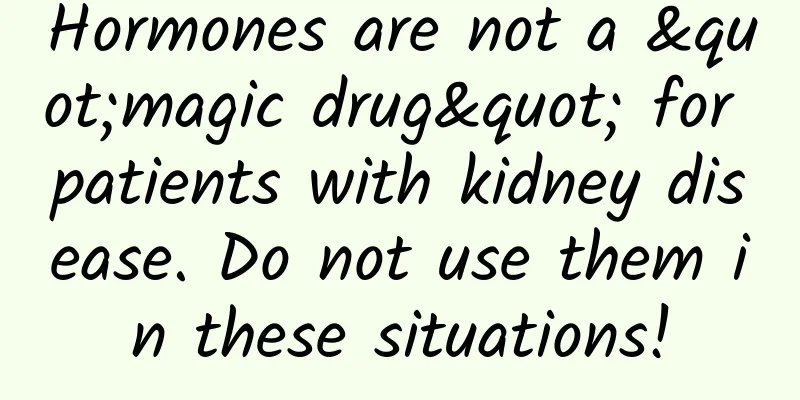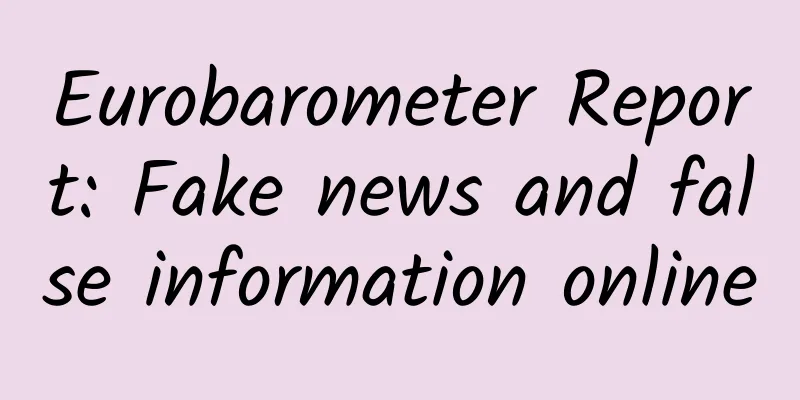Hormones are not a "magic drug" for patients with kidney disease. Do not use them in these situations!

|
Hormones can reduce proteinuria, protect renal function, and reduce or delay renal tissue damage. Most patients with kidney disease who have massive proteinuria and hematuria need to use hormones to delay the progression of the disease. Therefore, hormones have become one of the commonly used drugs in nephrology. The application value of hormones in the treatment of kidney disease is unquestionable. An international multicenter study led by the Department of Nephrology of Peking University First Hospital and published in JAMA confirmed that glucocorticoids can significantly reduce the risk of uremia in patients with IgA nephropathy. A study published in Frontiers in Molecular Biosciences by Professor Tang Rining's team from the Department of Nephrology of Zhongda Hospital Affiliated to Southeast University showed that long-term maintenance treatment with low-dose oral glucocorticoids (prednisone acetate 2.5-7.5 mg/d) for patients with nephrotic syndrome in complete remission or near complete remission can effectively relieve the clinical symptoms caused by the new coronavirus infection and reduce the recurrence rate of nephrotic syndrome. So which kidney disease patients need to use hormones during treatment? 1. Nephrotic syndrome: It is a common kidney disease with complex etiology, which may be related to infection, immune abnormality and other factors. It has the characteristics of long course and easy relapse, and is manifested by large amounts of proteinuria, hypoproteinemia, edema and lipid metabolism disorder. Hormones are the first-line treatment for nephrotic syndrome, which can inhibit immune response, reduce proteinuria, and relieve symptoms such as edema. 2. Acute glomerulonephritis: It is a self-limiting disease that can usually be cured through symptomatic treatment such as rest, diuresis, and anti-infection, without the use of hormones. However, in severe cases, such as severe edema, hypertension, renal impairment, or renal biopsy showing a large number of crescents, hormones are needed. Hormone treatment can help relieve symptoms and shorten the course of the disease. 3. Lupus nephritis: It is kidney damage caused by systemic lupus erythematosus. Hormone therapy is one of the main treatments for lupus nephritis, which can help control inflammation and immune response and reduce kidney damage. 4. Henoch-Schonlein purpura nephritis: It is kidney damage caused by Henoch-Schonlein purpura. Patients with Henoch-Schonlein purpura nephritis who have mild changes in urine examination (i.e. mild proteinuria, microscopic hematuria), mild changes in renal puncture biopsy, or focal mesangial proliferation changes, do not need hormone treatment for the time being, and symptomatic supportive treatment is sufficient. For patients with clinical manifestations of nephrotic syndrome and nephritic syndrome, rapidly progressive nephritis, pathological changes of diffuse mesangial proliferation with focal or diffuse crescent formation, or membranoproliferative nephritis, hormone treatment must be applied. In clinical practice, oral prednisone or intravenous infusion of dexamethasone and methylprednisolone are often used [1]. 5. After kidney transplantation: In order to suppress immune rejection reactions, patients may need to use hormone treatment. When hormones are used to treat kidney disease, higher doses of hormones, such as prednisone or methylprednisolone, are generally used to quickly control inflammation. After the condition is under control, the dose of hormones is gradually reduced to avoid adverse reactions caused by long-term use of hormones. After the condition stabilizes, lower doses of hormones are usually used to maintain treatment and prevent recurrence. Hormones are not a panacea, and not all kidney disease patients must use hormones. For example, kidney disease patients whose 24-hour urine protein quantification does not reach 1 g, or whose renal puncture results show mild lesions and no obvious inflammatory lesions, usually do not need to use hormones for treatment. It is recommended that after a renal biopsy to confirm the pathological diagnosis, the decision on whether to use hormone treatment should be made based on the cause and clinical characteristics to avoid blind use leading to adverse consequences. A clinical study from the United States published by Kidney360 showed that renal biopsy results can predict the treatment outcomes of patients with glomerular disease and diabetes after receiving hormones. The application of hormone therapy in kidney disease requires comprehensive consideration of many factors, formulating an individualized treatment plan based on the patient's specific condition, and adjusting the treatment plan in a timely manner according to changes in the patient's condition. In addition, hormone therapy has certain adverse reactions, such as osteoporosis, increased blood sugar, infection, etc. Therefore, when using hormone therapy, it is necessary to strictly control the dosage and course of treatment, and closely monitor the patient's condition and adverse reactions. References: [1]Wang Jinchao, Shi Nian, Mao Hui. Advances in the treatment of Henoch-Schonlein purpura[J]. Chinese Journal of Leprosy and Skin Diseases, 2018, 34(1): 53-56. |
>>: 7 eating habits that cancer cells love most. Check to see if you are one of them.
Recommend
What medicine should I take for multiple cervical cysts?
When it comes to multiple cervical cysts, many fe...
What are the cooking techniques for Mapo Tofu? Characteristics of Mapo Tofu
The raw materials of Mapo Tofu are all fresh, ten...
Why do women have pain on the right side of their abdomen?
Some female patients have pain on the right side ...
How many emergency contraceptive pills should I take at one time
Under normal circumstances, women take birth cont...
What is Golden Silk Gourd? Is Golden Silk Gourd delicious?
The shredded gourd is fragrant, slightly sweet, c...
Kidney crisis in diabetic patients: how to avoid the 'sweet burden'?
In modern society, the incidence of diabetes is i...
Can I have an abortion in three months of pregnancy?
It is not allowed to have an abortion in the thir...
How to maintain your uterus
Taking care of the skin can make us younger and m...
What is the best time to have an abortion?
In life, it is a very happy thing for young coupl...
What are the symptoms of vulvar itching?
Vulvar itching is a very common disease in daily ...
Breast pain with armpit and shoulder pain
For women, if you feel pain in your breasts and a...
Six symptoms of heavy moisture in spring and four methods to effectively remove moisture
Spring is here, and the climate is humid, cold, a...
When can the wood fragrance flower survive? How long does the wood fragrance flower bloom?
The wood fragrance flower grows very fast, and it...
What happens if there is a small amount of brown blood before menstruation?
Menstruation is very important for women's bo...









